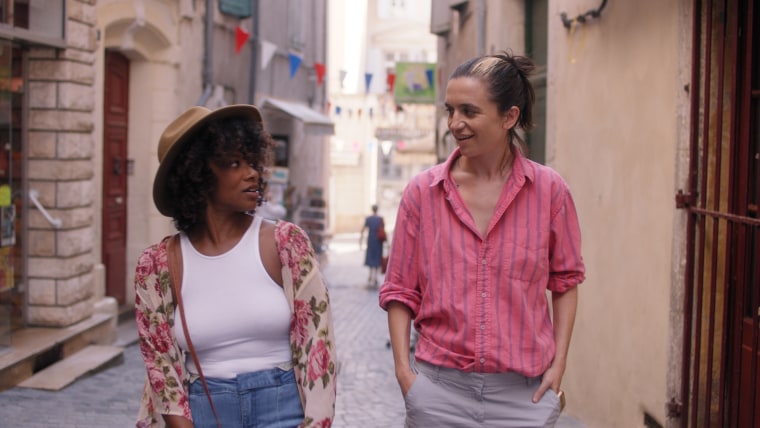For her debut feature film, filmmaker Marion Hill, who uses she/her and they/them pronouns, always wanted to tell a story that felt truthful to her own experiences — one that, as she said in a recent interview, “would really dive into relationships and characters in a way that was fun and multicultural and that would just be sexy and fun to watch.”
Directed, written and produced by Hill, “Ma Belle, My Beauty” — which won the Audience Award in the NEXT category at the 2021 Sundance Film Festival and premieres in theaters Friday — follows Bertie (Idella Johnson) and Lane (Hannah Pepper), two formerly polyamorous lovers who reunite for the first time in years at the insistence of Bertie’s husband, Fred (Lucien Guignard).
Two years after Lane gratuitously disappeared from their lives in New Orleans, Bertie and Fred have gotten married and moved to Fred’s family home in the French countryside. Realizing that his wife is still grieving the loss of her mother and feeling alienated in a small, white, European town, Fred decides to enlist Lane’s help to get Bertie out of a creative and emotional rut. But when Bertie refuses to buy into Lane’s attempts to re-create their old carefree dynamic, Lane begins seeing a stunning Israeli ex-soldier named Noa (Sivan Noam Shimon), which quickly reignites dormant jealousies.
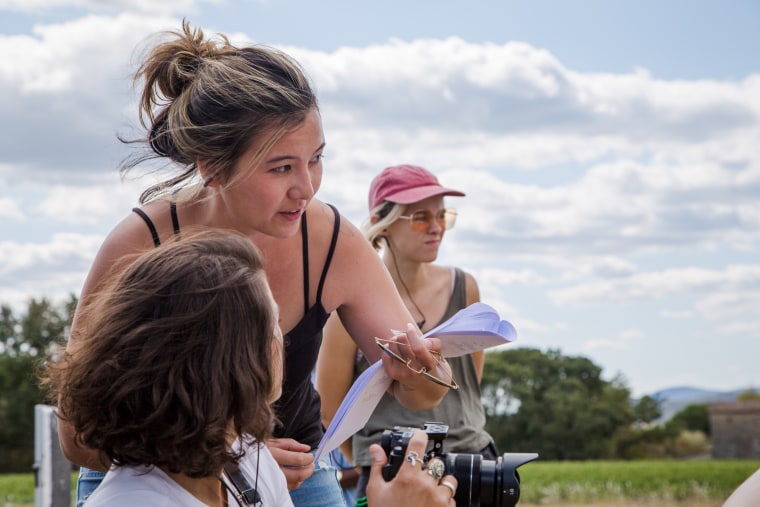
For Hill, who has roots in Vietnam, England and France, the film was born out of her attachment to a small town in France, where she had largely come of age and formed years of memories. “Setting a story against my own convoluted personal heritage (I am French by way of Vietnam, and thus a strange Asian presence in white rural France) was the only way I could envision my first feature,” Hill wrote in her director’s statement.
Hill, who is based in New Orleans, said in an interview: “Bringing a team and a community to that place and just getting to kind of fill that place with things that felt honest to me was what led to the film. It definitely felt like it was my responsibility to make that feature.”
Unlike traditional casting processes, in which writers or directors try to match actors with specific characters, Hill said that, while she had an outline for the story, she always intended to collaborate with actors to create characters that rang true to their own experiences. That meant “incorporating parts of their personality, their gender, their background, their race and culture into what was going on in the script,” she said.
At the 2018 New Orleans Film Festival, Hill approached Johnson, a local actor, after seeing her performance in a short film called “Blood Runs Down.” During the final stages of the casting process, Johnson did chemistry reads with several local actors, but Hill revealed that part of her always knew that Pepper was the right actor to play Lane. Hill had encountered Pepper, a New Orleans-based actor with a background in experimental theater, in passing and “was always attracted to their vibe, dynamic and energy.”
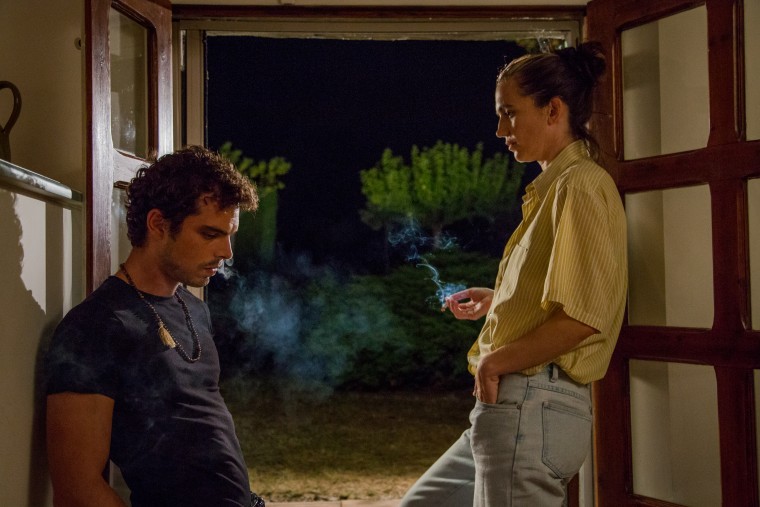
“Hannah came in, and it was palpable. And then Hannah left the room and Idella literally giggled, like blushing a little bit, and that sealed the deal,” Hill recalled with a laugh. “Then, we just hung out on a consistent basis, whether we were talking about the movie or not, and I think the three of us just kind of established a wonderful friendship, relationship and connection. So by the time we were on set, they had their own dynamic.”
That dynamic, Hill said, was crucial to maintaining a sense of intimacy and developing a sense of trust between the two lead actors, particularly when it came to filming a graphic and pivotal love scene toward the end of the film without an intimacy coordinator. “I’m very comfortable with sex and talking about sex, and they both were, as well, so we talked a lot about [how] the sex scene was such a big deal,” she said.
“We were fully aware and intentional about it. The whole film is referring to this relationship they shared in the past and watching them kind of figure out how to be with each other now,” she said. “They’re just in this room sharing the most powerful, intimate version of what they have, so that really influenced the lighting, and we wanted it to feel dark and almost chilling.”
In terms of blocking the scene, Hill said it was always important to emphasize the contrasting power and sexual dynamics between Bertie and Lane by showcasing “the subtleties of how their bodies are moving together, how they're speaking to each other, and seeing who is seeming really comfortable in what moment.”
“This is them in a vacuum, and there’s no one watching them,” she said. “That scene is our look into the depth of what they have, what they share.”
While she is pleased with the growth of queer femme love stories in recent years, Hill wrote in her director’s statement that she was “equally invigorated” when she saw how much was left to be explored in depictions of intimacy between women. “I also want to invite viewers to be fully immersed into the beauty of a world where women are existing in the fullest power, fullest nuance, and fullest sexual agency ... where we say what we want and we are driven by our own values and desires, not those of others,” she wrote.
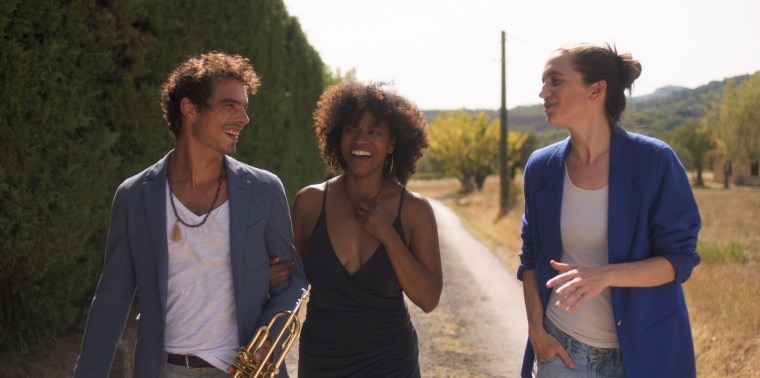
That ultimately meant creating characters who did not fall into the same mainstream tropes of LGBTQ cinema, such as struggling with sexuality or coming out, she said.
“Working with queer folks both in front of the camera and behind the camera just affirmed that that’s the world in which we are moving and telling the story,” Hill said. “We were able to talk a lot more about where these characters were coming from, what actually drew them to each other and what were their own issues personally — their own faults that were preventing them from getting what they wanted — outside of anything to do with their identity.”
Although she was able to infuse parts of her own identity and history to make the film “deeply personal,” Hill said she also had to do some research about polyamory while she was writing the screenplay. “If I had judged polyamory, I probably wouldn’t want to incorporate it into the film,” she said frankly.
“I think what was most eye-opening for me when I was learning about polyamory for the first time was how much of it is communication and is consent-based rather than sex-based, which other folks still think that it is,” she said. “I wanted to also kind of explore the beauty of polyamorous partnerships that might not be sexual, like the Fred and Lane relationship, which again comes out of tremendous trust and empathy and kind of the sense of family that, historically, we haven’t really seen when it comes to relationships involving more than two” people.
“It was important to me that we not be explaining polyamory both because that’s boring and also because you can’t really explain something like that,” she added. “Everyone practices love, polyamory, gender and sexuality differently. So to try and demonstrate what it was and what the issues with it are would not have been a good film.”
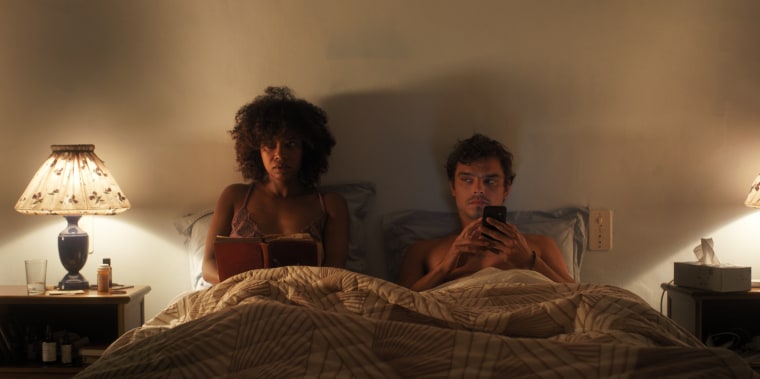
With the Covid-19 pandemic continuing to hinder domestic and international air travel, “Ma Belle, My Beauty,” which was shot before the pandemic, feels like a welcome escape for North American cinephiles who are longing for a visit to the European countryside. Describing the process of filming the indie as a “beautiful, once-in-a-lifetime experience,” Hill said the small cast and crew lived together in neighboring houses and took full advantage of the picturesque countryside, dining and drinking together at the end of every long day of production.
“I think, because of that, there was just this safeness to the setting,” Hill said. “Idella’s experience of walking through the neighborhood and having French people come and try to talk to her — she was able to bring that in the scenes where she’s surrounded by French people. It made everything really real for everyone, and I think it really came out in everybody’s work.
“It was just this beautiful, cultural group of folks. We had Idella singing jazz with our French boom operator, who was a wonderful guitar player, and they would do concerts. We had our production manager from Paris, and she would do percussion. Everyone kind of contributed to just the vibe, and there was not a single bad apple in the whole group.”
Hill said that since she debuted the film at the first virtual edition of the Sundance Film Festival, she has gotten positive feedback from audiences from all walks of life, which, she said, is “affirming that what I want to see is also what other people want to see.”
“I really think of this film as my experiment in that I didn’t go into it with tons of intentions for what I wanted to say or how I wanted it to be received, which is a lot more scary than I realized it would be,” Hill said. “But seeing how people are responding to things that I really took risks on and seeing people take away so much nuance and wanting to talk about it, that was sort of the most that I could hope for.”
In the end, Hill wrote, her greatest hope for the film is “for everyone to be able to find a piece of themselves in one, or many, of the characters, and for discussions to emerge around the boundless possibilities of what love can look like, and how we must take care of each other in pursuing these liberating ways of loving. ... This is the film that could have shown a young and confused me what kinds of relationships are possible.”
“Ma Belle, My Beauty” will be released in theaters Friday.
